An oratorio is a musical composition with dramatic or narrative text for choir, soloists and orchestra or other ensemble.
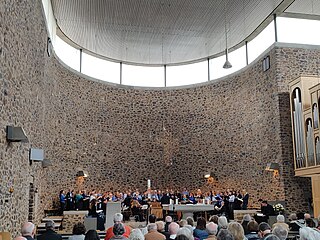
St. Martin is the name of a Catholic parish and church in Idstein, Rheingau-Taunus-Kreis, Germany. The official name of the church is Katholische Pfarrkirche St. Martin. The name of the parish became St. Martin Idsteiner Land on 1 January 2017, when it was merged with five other parishes. The parish is part of the Diocese of Limburg.

Helmut Alfons Schlegel is a German Franciscan Catholic priest, meditation instructor, author, librettist and songwriter. He is known for writing new spiritual songs, set to music by various composers.

Neues Geistliches Lied, abbreviated NGL, is a music genre of songs in German intended for church usage, and based on contemporary lyrics and with music by contemporary composers.

Eugen Eckert is a German social worker, minister, singer-songwriter and academic teacher. He is known for his lyrics for new spiritual songs, and his oratorios and musical plays.
Winfried Heurich is a German organist and composer. He was director of church music at Liebfrauen, Frankfurt from 1966 to 2000 and composed music for more than 400 songs.
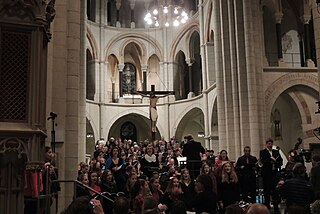
Laudato si' is an oratorio composed in 2016 by Peter Reulein on a libretto by Helmut Schlegel. Subtitled Ein franziskanisches Magnificat, it includes the full Latin text of the Magnificat, expanded by writings of Clare of Assisi, Francis of Assisi and Pope Francis. The composer set it for five soloists, children's choir, Choralschola, mixed choir, symphony orchestra and organ. It was published in 2016 by the Dehm Verlag, and was premiered on 6 November 2016 at the Limburg Cathedral, conducted by the composer.
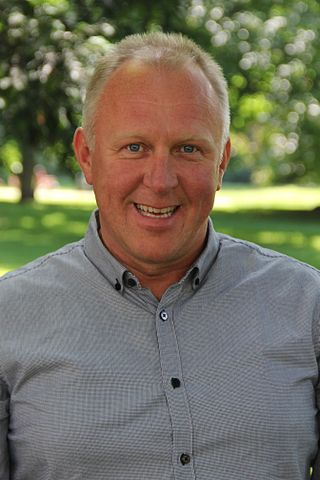
Patrick Dehm is a German Catholic theologian, supervisor and clinical Gestalt therapist. He and his brother founded the Eugen Dehm foundation, supporting a holistic health concept, in memory of their father.
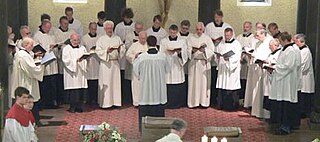
A Choralschola, known simply as schola, is a choir for singing Gregorian chant or plainsong. It consists traditionally of only men, but more recent groups sometimes also include female voices. A schola often performs in uniform. The group may perform in the liturgy of church services, but some specialized ensembles also perform concerts and recordings, such as the Choralschola der Wiener Hofburgkapelle and the Schola Gregoriana Pragensis.
Joachim Raabe is a German church musician and a composer of sacred music, especially of the genre Neues Geistliches Lied.

"Glauben können wie du" is a Christian poem by Helmut Schlegel, written in 2009, and made a hymn of the genre Neues Geistliches Lied with a melody by Joachim Raabe the same year. It addresses Mary, the mother of Jesus, to be imitated living the theological virtues of faith, hope and love. The song is included in song books and the Catholic hymnal Gotteslob.

Johannes Hill is a German baritone in concert and in oratorios, who has performed internationally. Singing in choirs from age 10, he has performed major roles in oratorios, such as both Jesus and Pilate in Bach's Passions, and Pope Francis in the premiere of Laudato si'. He has also performed in vocal ensembles such as Kammerchor Stuttgart and Collegium Vocale Gent.
Andreas Großmann is a German organist, church musician and conductor. He is the head of the Referat Kirchenmusik in the Diocese of Limburg, responsible for its church music.

"Gott, der du warst und bist und bleibst" is a Christian hymn with text by Eugen Eckert and a melody by Herbert Heine. It is also known by the title of its refrain, "Wir haben hier keine bleibende Stadt". The song was written in 1993, in the genre Neues Geistliches Lied (NGL). It appears in several regional sections of the German Catholic hymnal Gotteslob, and in other songbooks.

"Meine engen Grenzen" is a Christian poem by Eugen Eckert, written in 1981, and made a hymn of the genre Neues Geistliches Lied with a melody and setting by Winfried Heurich the same year. The song, bringing one's shortcomings and limitations before God and praying for a broader perspective, is part of the common German Protestant and Catholic hymnals, and of other songbooks.
Eins is an oratorio written on a commission from the Ökumenischer Kirchentag 2021 in Frankfurt, Hesse, Germany, the third ecumenical convention of lay Christians of different denominations in Germany. The text was written jointly by the Protestant pastor Eugen Eckert and the Catholic Franciscan Helmut Schlegel. The music of many genres was composed by Peter Reulein for the more traditional parts and by Bernhard Kießig for jazz and pop elements. The work is subtitled Ökumenisches Oratorium in vier Bildern für Solisten, Chor, Orchester und Band.
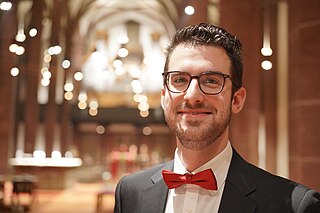
Johannes M. Schröder is a German organist, composer and Catholic church musician. After several years responsible for the church music at the Westerwälder Dom, he moved to St. Bonifatius, Wiesbaden. He is also a lecturer and a music editor.
"Auf dem Weg durch diese Nacht" is a Christian hymn created in 2005 by lyricist Eugen Eckert and composer Horst Christill. The song of the genre Neues Geistliches Lied (NGL), was first published and recorded in 2006, and has appeared in German hymnals and songbooks. Auf dem Weg durch diese Nacht became the title of a 2021 choral collection of new compositions for Abendlob.
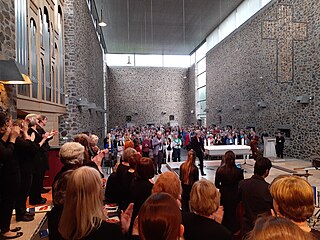
Peter Reulein's Te Deum is a choral composition completed in 2018, a setting of the Te Deum. It is scored like Palmeri's Misatango, for four-part choir (SATB), bandoneon, piano and strings; it also uses Latin-American dance rhythms.














